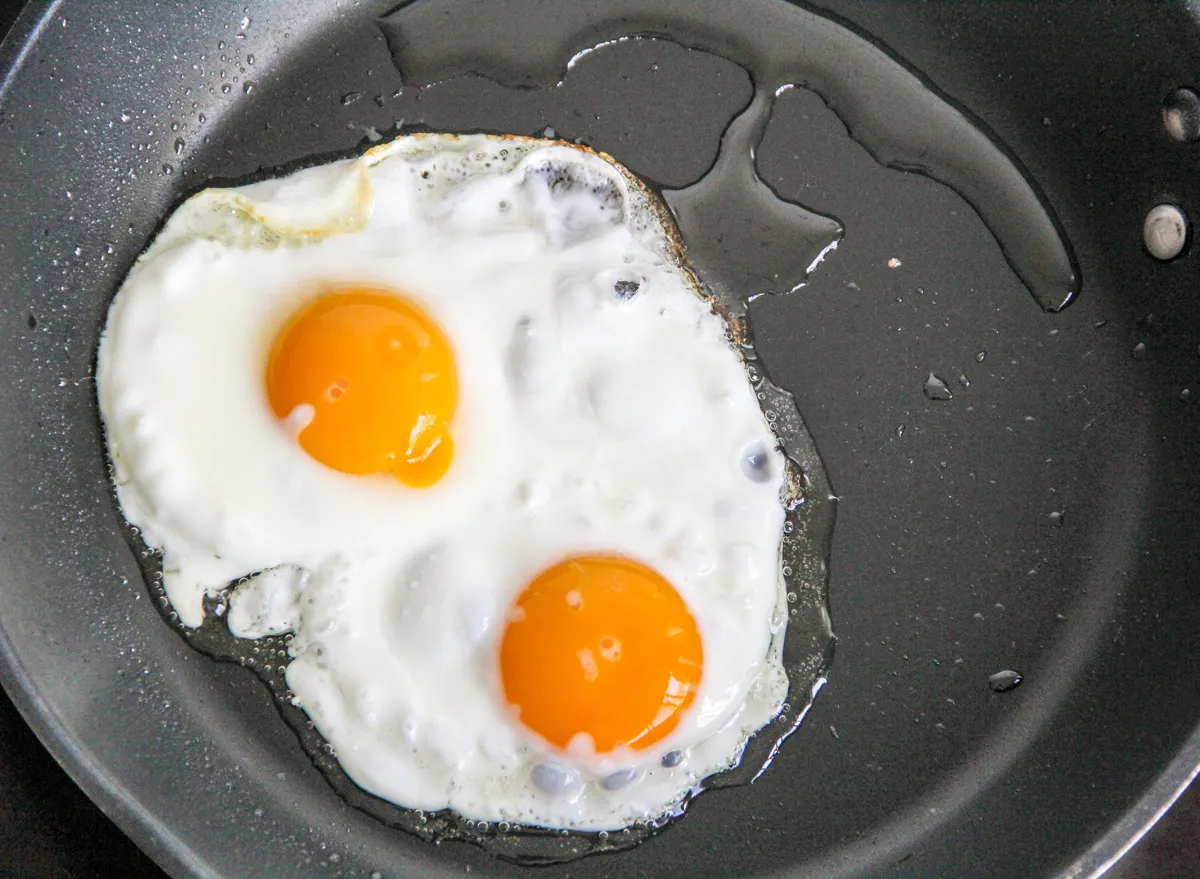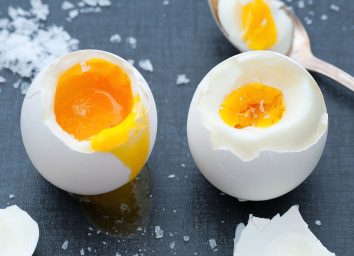The #1 Unhealthiest Way to Make Eggs, According to Dietitians

Quick! When I say "breakfast" what do you picture? Did you think eggs? So did we. And so did a lot of people. That's because eggs have been a breakfast staple for centuries—and it's not just because they were conveniently found on farms.
Eggs are a fantastic source of many essential nutrients.
"Egg whites are an incredible vegetarian source of protein and the yolks are a powerhouse of vitamins and minerals including Vitamin A, B12, Selenium, Choline (important in cell structure + function) and lutein/zeaxanthin (both of which promote eye health)," says registered dietitian Lindsay Wengler, MS, RD, CDN of Olive Branch Nutrition. Wengler also notes that eggs may have been given a bad rap for their cholesterol levels in the past, but we now know that "eating them does not raise cholesterol as previously thought." (Related: Surprising Truths You Need to Know About Eggs, Say Experts.)
But if you want to reap the most benefits from eggs, we urge you to consider your preparation method of choice before taking a crack at it.
While there's no wrong way to prepare eggs, there are some methods that are less healthy than others. Curious as to what those are, we spoke to registered dietitians to ask them what the absolute unhealthiest way to make eggs is, and they agree that it's by frying them in too much oil over high heat.
Why the unhealthiest way to cook eggs is to fry them at high heat.
Although frying eggs is one of the most popular methods of preparing eggs, it's not necessarily the healthiest method you can choose.
That's because oil is high in calories and saturated fats. And butter is one of the worst offenders.
"If you are frying eggs in butter, you may counteract some of the wonderful health benefits of eggs. Eggs are naturally high in protein and low in saturated fat, but as soon as you add butter to the mix, the saturated fat in your dish shoots up. This is something we don't want, as excessive saturated fat in the diet is closely linked to heart disease," says Katherine Basbaum, MS, RD, a registered dietitian at UVA Health's Heart and Vascular Center.
"The 2020-2025 Dietary Guidelines for Americans suggest keeping saturated fat intake to less than 10% of total calories per day. The use of saturated fat in cooking eggs adds significant calories to the dish as well as unhealthy fat that has been linked to an increased risk of heart disease," adds Tara Tomaino, RD, a New Jersey-based registered dietitian.
Tomaino notes that it's not just butter that you have to beware of: coconut oil and bacon grease are also bad offenders, as is cooking eggs in a casserole or quiche that contains high amounts of saturated fat in the form of cream, cheese, or breakfast meats. Using all of these ingredients "can detract from the high nutritional profile of eggs," she explains.
There's even one step unhealthier than frying eggs: frying eggs at high heat.
"Cooking at high temperatures oxidizes oils, and when consumed this can trigger inflammation in the body," says registered dietitian Rebecca Washuta, MS, CNS, LDN of Happy Healthy Bites. "When frying or sauteing eggs it's important to use an oil with a high smoke point like avocado oil to prevent oxidation," she adds.
How to cook eggs instead
Although frying eggs isn't the healthiest way to cook eggs, there are some tips you can use so that you can still enjoy fried eggs but at less of a cost.
For example, "try cooking eggs with a cooking spray, which preps your pan for cooking eggs with almost zero fat and calories," recommends Basbaum.
Or opt for healthier fats than butter or bacon grease.
"Cooking eggs with minimal fat or using unsaturated fats like olive oil or avocado oil are healthier alternatives. Hard-boiling or poaching eggs are ways to prepare eggs without any need for additional fat!" says Tomaino.
While how you cook your eggs can affect their healthfulness, what you're serving them with also matters.
"Serve up eggs with a hearty portion of vegetables to provide an extra boost of nutrition, fiber, and fullness to your meal. Dark leafy greens like kale, spinach, and arugula make great additions to eggs, as well as veggies like asparagus, broccoli, peppers, and onions," recommends Tomaino.
Combining eggs with veggies (like in a scramble or an omelet) increases the nutrient density of your meal, the absorption of fat-soluble vitamins found in veggies, and keeps you fuller for longer, notes Wengler.
So get crackin with these healthy egg recipes, and for more on this popular breakfast food, read about The One Ingredient Everyone's Adding To Their Eggs.
For more healthy eating news, make sure to sign up for our newsletter!








